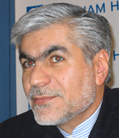Iran's UK Ambassador: Tehran-Tokyo Ties Good, No Fear of US Attack
His Excellency Dr. Seyed Mohammad Hossein Adeli (Ambassador of the Islamic Republic of Iran to the United Kingdom), J. Sean Curtin (Fellow, GLOCOM and Asia Times), Brian Hanrahan (BBC Diplomatic Correspondent, BBC Television News), Dr. Mamdouh G. Salameh (International Oil Economist and World Bank Consultant) and Samir Nassif (Journalist, Arab Press)
Sean Curtin: I would like to ask you about your country's relationship with Japan, specifically, the following three points. Firstly, do you think the present Tokyo-Tehran relationship may be affected by the tougher line the Bush administration has adopted towards your country? Japan is a close ally of the US, last year Washington was strongly against a Japanese consortium signing a US$2 billion deal with your government to develop the Azadegan oilfield.
Secondly, what is Iran's view of Japanese troops being stationed in Iraq as part of the US-led coalition forces?
Thirdly, what is the Iranian government's attitude towards Japan's efforts to help mediate in the Israeli- Palestinian conflict?
 Ambassador Adeli: Firstly, on our relations with Japan, you know that we maintain a very good relationship and will continue to do so. Ambassador Adeli: Firstly, on our relations with Japan, you know that we maintain a very good relationship and will continue to do so.
With regard to foreign troops, we have taken the same stance to all the foreign troops who want to be in Iraq and that is the engagement of foreign military forces is not an acceptable option. We do not believe that it will help with the stability of Iraq and this is regardless of whether the troops are from Japan or another country. Having said that, I believe and understand that the number of Japanese forces deployed in Iraq is very limited. Also, these forces are primarily engaged in a humanitarian mission.
On the final point, of course, in situations of crisis, we wish whichever country that wants to mediate in a situation of international crisis, good luck.
Brian Hanrahan: As you may know, [U.S. Secretary of State] Condoleezza Rice is in London and was asked about the possibility of military action against Iran and has said it is "not on the agenda." * Do you take that to mean that it is still possible or not possible?
Ambassador Adeli: Well, I do not want to exchange attacks with the Americans, so I will not respond to these kinds of assertions.
 Mamdouh Salameh: Do you agree with the view that the United States would not dare attack Iran after their debacle in Iraq? Would you agree that Iran possesses a very strategic deterrent against such an attack? Namely that they could block the Straits of Hormuz and thus precipitate the biggest oil crisis in the world. Mamdouh Salameh: Do you agree with the view that the United States would not dare attack Iran after their debacle in Iraq? Would you agree that Iran possesses a very strategic deterrent against such an attack? Namely that they could block the Straits of Hormuz and thus precipitate the biggest oil crisis in the world.
Ambassador Adeli: Well, here again, I don't want to enter the world of fantasy about a war in the Straits of Hormuz with the price of oil going up and down. It is not something I am going to do. The Americas know where Iran is and what it is. We have our own capability. It is not much, as we are talking about Iran. We will see if these facts will be taken into consideration or not.
In response to a question about a possible attack on Iran by Israel, the ambassador made the following remarks. His comments about the effectiveness of such a strike are perhaps of most interest.
Ambassador Adeli: On a military strike by Israel, well as I responded to earlier questions of this nature, let's see what happens. I do not think it is proper to respond to these kinds of hypothetical questions of what happens if X does this and Y does that and so on.
However, I would question whether a military strike could eliminate the knowledge of nuclear technology from a country. I mean, it is highly doubtful that by destroying a certain place the technical know-how would somehow magically disappear from people's minds.
Here is some of what the ambassador had to say when questioned about Washington-Tehran relations.
Ambassador Adeli: It is wrong to say that all the history between Iran and the United States is the failure of Iran to reconcile with the United States and it is all down to the leaders of our regime. No, I reject this interpretation. In fact there have been many occasions, in one way or another, on which Iran has shown it has a very reconciliatory approach. This has been done in the hope that the Americans would respond in an appropriate way, which could have really open the way forward.
For example, let's go back to the time when the United States was starting to invade Afghanistan. In the first three weeks, their attempts were frustrated and they were not really able to make any progress. They could not deploy their ground forces into the areas they wanted, so they were limited to aerial bombing. Then they came to Iran and asked Iran for assistance. Iran obliged by providing assistance in the hope that this kind of cooperation would lead to some kind of reconciliation on both sides.
However, as I understand it, the grievances between Iran and the US are not just the simple kind of grievances that can be solved in a short period of time. But our actions in Afghanistan should have helped, but instead of being rewarded, Iran was dubbed the "Axis of Evil" For all the help that Iran extended to the United States in Afghanistan that was the reward.
Again in Iraq, there is no doubt that Iran has played a big role in keep a large section of the population calm and being supportive towards the schedule for the election. Again, instead of receiving any reward, we were given the label "Outpost of tyranny" or some such title…
Specifically on Iran-Iraq relations, he said, "Iraq's stability and being on good terms with the country are vital to Iran's interests."
Samir Nassif: There is a lot of pressure being exerted on Syria and Lebanon over [UN Security Council resolution] 1559 [demanding a withdrawal of Syrian troops from Lebanon and a disarmament of Hizbollah]. What if the United States decided to increase this pressure? What would the attitude of Iran be? Will you be pragmatic or will you be standing on the side of your ally Syria? If you decide to stand on the Syrian side, how will you do it?
Ambassador Adeli: We certainly do not see it as legitimate to exert pressure on Lebanon and Syria. I mean, these countries have legitimate rights in the region. They have their own governments. So, I think it is also quite a pragmatic policy to take into account the situation and destiny of your allies and friends. So, with regard to this, I think we should wait and see how the situation develops and then decide how to proceed from there.
Profile: Dr. Seyed Mohammad Hossein Adeli
Dr. Adeli is a senior figure in the Iranian foreign ministry. Before taking up his current post (Ambassador of the Islamic Republic of Iran to the United Kingdom) in October 2004, he was Iran's Deputy Foreign Minister. According to the Royal Institute for International Affairs, his previous posts include Ambassador to Japan and Ambassador to Canada.
* Note
Exact of comments made by U.S. Secretary of State Condoleezza Rice on 4 February 2005
In answer to a question about an attack on Iran over its nuclear program Secretary Rice said, "The question is simply not on the agenda at this point," She added, "We have many diplomatic tools still at our disposal and we intend to pursue them fully." However, she did warn that Tehran must not "use the cover" of civilian nuclear power projects "to sustain a program that can lead to a nuclear weapon."
The above comments were made at Chatham House (Royal Institute for International Affairs) in London on 4 February 2005
Copyright 2005 Asia Times Online Ltd. A few sections from this article have appeared in Asia Times Online, http://www.atimes.com, and those parts are republished with permission.
| 




